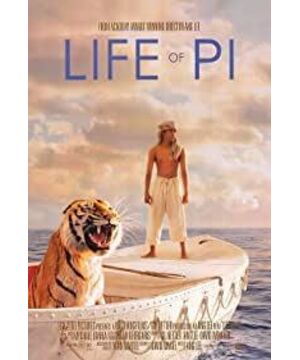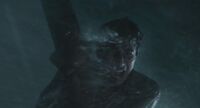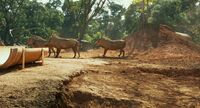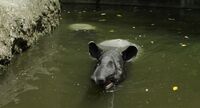"Pi's Fantasy Drifting" is a beautiful and dreamy film, but the real events may be more cruel than the second version of the story that Ang Lee tells for Pi. Ang Lee used a "simple and rude" method when dealing with this paragraph: let the actor speak directly to the camera. At first, it was like a calm monologue. The few words he told gradually touched the truth, and finally the young Pi burst into tears, which were real tears. Ang Lee's seemingly understated handling is really cool. If the director of a domestic film is changed, it may be repeated over and over again, resulting in self-defeating overuse.
Ang Lee has a scholarly temperament and is a director who focuses on cultural conflict and human nature exploration. "The Fantastic Drift of the Boys" does not escape this appeal in essence. In terms of visual effects and 3D special effects, this is an entertaining commercial blockbuster, but throughout the whole film, you can always smell a cold breath from the thinkers of the film, in today's "prosperous world on the lips" background It always seems a little out of place in the impetuous and noisy atmosphere of the domestic movie market. But on the whole, it is a success. The key to this success lies in the blending ratio between the display of the ultimate dream and the exploration of human nature. This ratio is not something that ordinary directors can handle. It is directly related to the final commercial fate of the film. . This is also one of the main reasons why a high-quality commercial blockbuster is more difficult to create than a niche film that focuses on artistic exploration.
Perhaps due to my personal theoretical background and movie viewing habits, the author's interest in gorgeous stunts and curious plots is far less than his interest in film narrative techniques and textual connotation mining. The latter part of "Pi's Fantasy Drifting" brought me a series of thoughts. In contrast, it is reminiscent of another film "Stranded" adapted from the 1972 Andes air crash, which tells the story of a charter plane carrying the Uruguay football team that crashed in the Andes on October 13, 1972; More than 20 survivors who were trapped on the mountain feasted on the bodies of the deceased and survived in the snow and ice for more than ten weeks. In December, two of the team members walked more than 70 kilometers down the mountain and were finally rescued. One is at sea and the other is in snow-capped mountains, both of which are extreme dilemmas brought by nature to human beings. At this time, there may be three versions of the story. "The Fantastic Drifting of Pi" mainly tells the first version, which is a dream version. Is it possible for this version to be realized? Yes, maybe there is, but the probability must be very small, almost negligible. The latter two versions are universal events with profound propositions, and this event is "cannibalism".
"Cannibalism" is known as the "Blood Curse of Civilization", which is the most extreme atrocity that can subvert human civilization. Although in the "great" Chinese civilization, cannibalism is not necessarily so despicable (see the historical materials "Xu Zi Zhi Tong Jian", Volume 167: An Shi Rebellion, Tang general Zhang Xun guarded Suiyang City, was besieged by rebels, the city ran out of food, So Zhang Xun "went out of his concubine and killed the three armies to kill the sergeant. He said: All the dukes worked hard to defend the city for the country. Soldiers, what a pity for this woman”. This cannibalism incident is regarded as an eternal story in China.) Looking back at the history from the An-Shi Rebellion in the middle of the 8th century AD to the shipwreck in 1884 and the Andes air disaster in 1972, more than 1,200 Over the years, from the Tang general Zhang Xun to the sergeant who killed his concubine in a dignified manner to the young Parker who was "quietly" murdered and then divided into food and then to the rugby players who voluntarily sacrificed their bodies in an air crash, this can be regarded as " The "cannibal" incident is a significant leap in the progress of human civilization. Those football players who have been baptized by modern civilization have created a great feat, a tenacious survival instinct and a reverence for civilization, and they have not abandoned the latter. In fact, this feat has nothing to do with the "morality" vigorously advocated by the Chinese people. Faced with the ultimate dilemma, the "morality" of human beings is fundamentally unreliable, and even far less than the role of "religion". In this situation, Western modern civilization respects The respect for the individual life and the belief in the authority of "contract" and "order" in modern society finally help human beings overcome their own primitive instincts and avoid the occurrence of "unconscionable" things.
In the film "Pi's Fantasy Drifting", Richard Parker is a powerful Bengal tiger who seems to be invincible except for nature at sea. The young Pi is eager to communicate with it, even though his father has warned him that he is "tiger". There is only your own projection in your pupils", but he never gave up this glimmer of hope. A plausible result is explained in the film: the tiger goes deep into the jungle without looking back, and it is gone forever, and the young Pi seems to finally be in vain. On the surface, this is about the communication and friendship between humans and animals, and the harmonious coexistence between humans and the natural world. But if that's the case, it's not a big deal, because there are so many movies of this type. In my opinion, tigers are actually more like the materialization of human fear, or a mirror of human nature. Originally, there is no right or wrong in human behavior, nor is there good or evil in human nature. Right and wrong are relative, and morality is unstable. People's fear comes from the unknown world and self, and the fear brought by the latter is actually even worse. The line of civilization is fragile. People walking on this string, like a "Davas" hanging high in the air, must be in danger. Various dilemmas are like swings caused by different winds, not necessarily the ultimate shipwreck or air disaster. Blow us down into dark and deep ravines. Sometimes we can climb back up, but sometimes we can't go back.
View more about Life of Pi reviews











